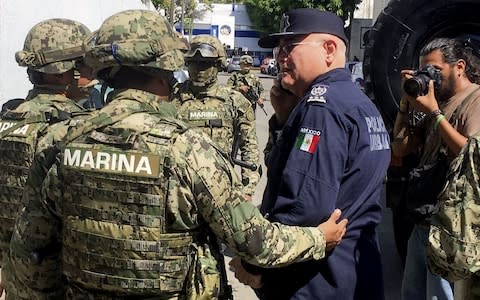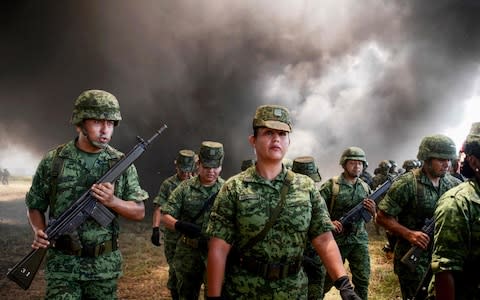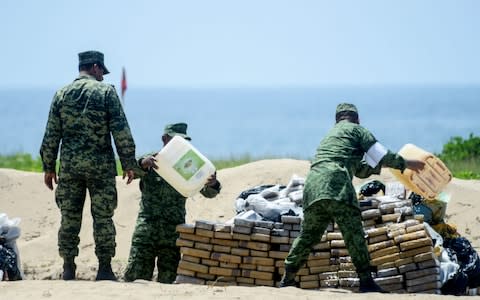Marines swoop on Acapulco as entire police force in faded resort city infiltrated by cartels

It was once a magnet for the stars, where millionaires would brush shoulders with Hollywood actresses and ex-US presidents under the palm trees of its horseshoe bay.
But on Wednesday the military had swept in to take over Acapulco as the entire police force of one of Mexico's most famous resorts was accused of being in the pockets of drug cartels.
Federal agents from Mexico’s police and army took over public security in the troubled beach town, disarming the local police force over concerns that it was being controlled by drug trafficking gangs behind the spiraling murder rate amid peaking levels of violence across Mexico.
Acapulco – which between the 1950s and 1980s was a glamorous resort favored by Hollywood stars - now ranks as one of the most violent cities in the world, with a murder rate of 103 per 100,000 inhabitants.
Frank Sinatra and the Rat Pack were once regulars there, and John and Jaqueline Kennedy honeymooned at the resort city. Now dozens of criminal groups are vying for power across Guerrero, the state on whose coast Acapulco sits, which is one of the country’s poorest and most violent areas.

Although hotels still fill near to full capacity during high season, the violence in Acapulco has reached epic levels, with killing happening on the seafront and beaches as well as the city’s backstreets.
The mountains of Guerrero are considered Mexico’s heroin heartlands. Impoverished peasants tend to fields of poppies that are processed into heroin and shipped north to the United States to feed a booming appetite for the drug, a result of the ongoing opioid addiction crisis north of the border.
Some 100 Mexican marines, soldiers and federal police agents moved into the local public security on Tuesday afternoon in response to what they said was a lack of police action against crime, murders and drug-related violence in the area.
Federal police agents and the military have had a presence in the city for years, but the latest move shifts the coordination and decision making around pubic security away from local authorities. Federal police will now also be in charge of criminal investigations.

Following the move, the American embassy issued a warning reminding tourists not to travel to Guerrero because of the risk caused by crime.
Roberto Alvarez Heredia, the spokesman for the state security board, said that two police officers – Luis Fernando “N” alias “El Fenix” and Brayan Antonio “N” alias “El Brayan,” were arrested for their connection to a number of murders and criminal groups. Some reports suggest that the two individuals were effectively controlling the local Public Security Secretary to serve the interests of crime bosses.
Álvarez Heredia, said that all of Acapulco’s police would now be "evaluated and submitted to trust tests, as protocol dictates.”
Much of Mexico and Guerrero state's surging violence is been driven by demand for cocaine and heroin in the US. Patients addicted to prescription painkillers once liberally dished out by doctors have moved from pills to Mexican heroin – which is cheaper and more easily available – to feed their hibbits. As a result, heroin production in Mexico has spiked in recent years, pushing up violence and criminality as rival groups fight for the control of routes and production.

Then-president of Mexico Felipe Calderon launched a government crackdown on organized crime when he took office in Mexico in 2006. Since then, insecurity across the country has risen, with a few lulls. Currently Mexico is suffering the highest homicide rates that it has seen in modern history.
Mexico has launched similar operations numerous times in recent years when a police force is suspected of being infiltrated by organized crime, but it is unusual in a city the size of Acapulco, which has nearly 700,000 inhabitants, about the size of Leeds in the UK.
Independent security analyst Alejandro Hope told The Telegraph: "The new forces that emerge from these processes tend to be no better than the ones they replace."
"In the short term it might improve things but at the end of the day they’re [the federal forces] going to leave – how do you make sure that the new police that emerges is better than this one? That has to do with accountability, transparency and institutional development and other issues that are much more complicated."

 Yahoo News
Yahoo News 
